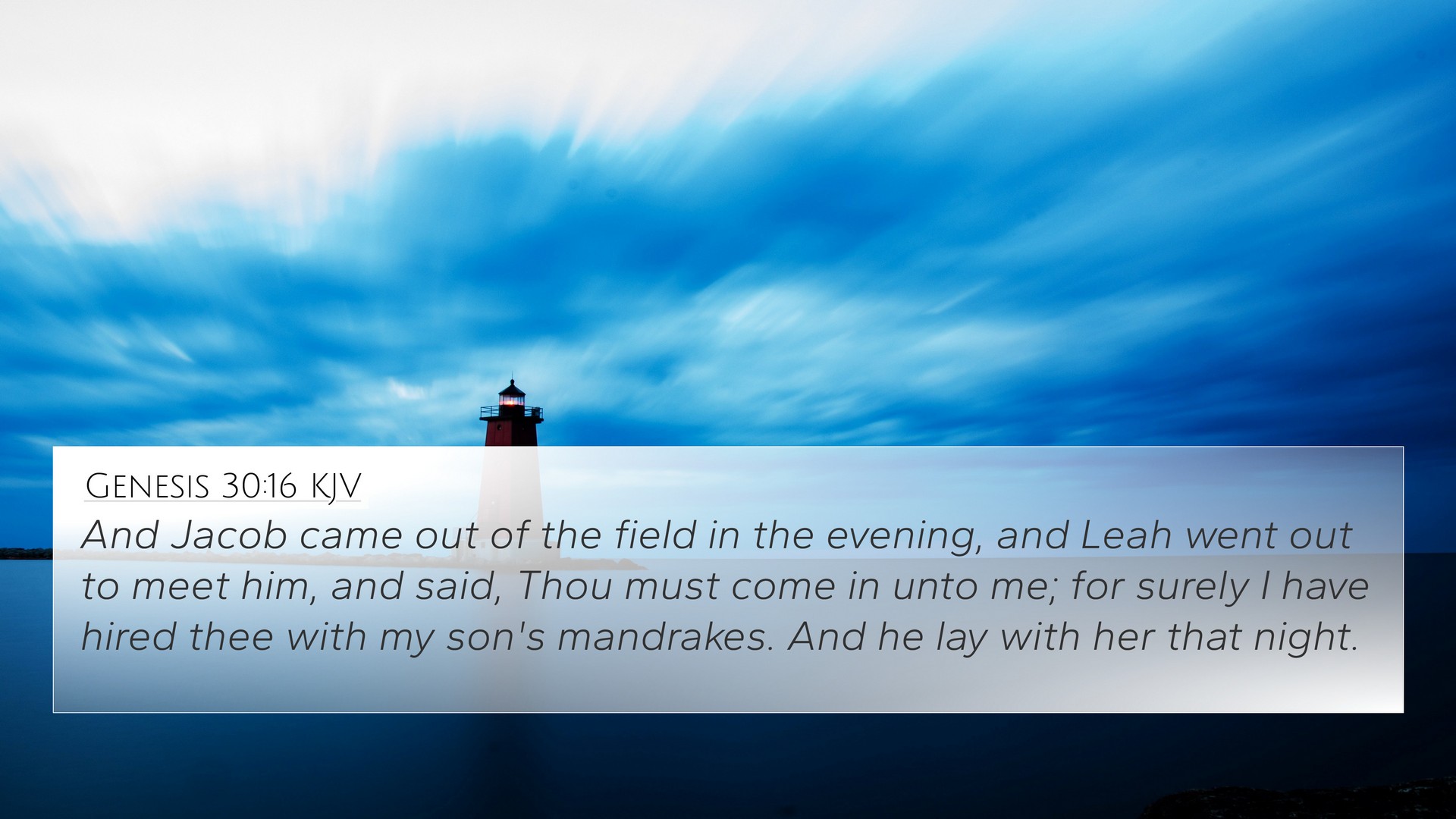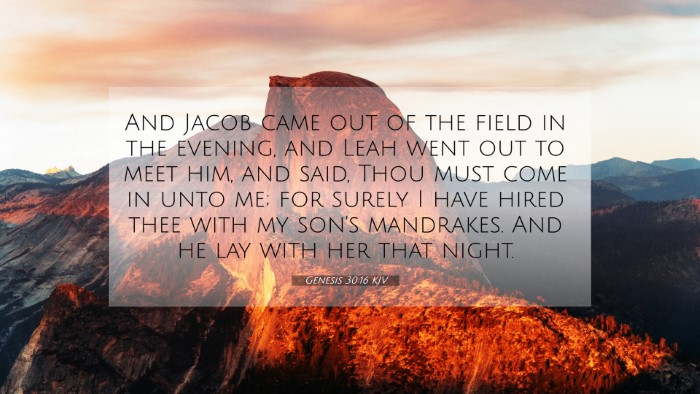Understanding Genesis 30:16
Genesis 30:16 (KJV): "And Leah said, God hath given me my hire, because I have given my maiden to my husband: and she called his name Issachar."
Summary of Genesis 30:16
This verse captures a moment in the life of Leah, one of Jacob's wives, who interprets the birth of her fifth son, Issachar, as a divine reward for her actions. The context involves the ongoing competition between Leah and her sister Rachel for Jacob's affection and for having children.
Meaning and Context
This portion of Scripture follows the narrative of polygamy in ancient Israel where Leah, having realized she couldn’t bear more children herself, offers her maid Zilpah to Jacob to bear children on her behalf. This act symbolizes Leah’s desperation but also her agency in the cultural context of her time. Let's break down the verse further using insights from notable commentators:
- Matthew Henry: Emphasizes Leah’s acknowledgment of God’s hand in the matter, suggesting that she feels divinely rewarded for her willingness to involve her maid in hopes of pleasing Jacob.
- Albert Barnes: Notes that Leah’s naming of Issachar reflects her perception of God’s justice, as she believes her actions deserved recognition and Divine compensation.
- Adam Clarke: Points out that the name Issachar can be linked to the concept of hire, indicating Leah's insight into the providence of God in rewarding her for what she gave up.
Thematic Connections and Cross-References
Genesis 30:16 directly touches on themes of God’s providence, familial conflict, and the role of women in biblical narratives. The verse's significance extends beyond itself, connecting with various other scriptures. Here are several related cross-references:
- Genesis 29:32-35: The birth of Leah’s previous children and her reactions to their births offer foundational context for her feelings in this verse.
- Genesis 30:1-2: Rachel's jealousy and her proposal to Jacob about giving Bilhah to bear children underscores the competitive relationships at play.
- Exodus 1:19: The midwives' insight into the value of Hebrew motherhood parallels Leah's reflections on her own worth as a mother.
- 1 Chronicles 2:1-2: The genealogy that includes Issachar reaffirms God's plans and purposes through this lineage.
- Psalm 127:3: The idea that children are a heritage from the Lord resonates strongly with Leah's perceptions of motherhood.
- Genesis 49:14: Jacob's later blessings—including Issachar's role—exemplify the long-term significance of this verse within the larger narrative.
- Luke 1:53: The narrative of God's provision and justice continues to unfold in the New Testament, affirming God’s overarching plan and care.
Comparative Analysis with Related Verses
When engaged in comparative Bible verse analysis, one can observe parallels with other biblical figures who also sought divine favor through their actions or sacrifices:
- Sarah’s offering of Hagar (Genesis 16) reflects a similar dynamic of striving for family fulfillment.
- Hannah’s prayer for a son (1 Samuel 1), which led to the birth of Samuel, echoes Leah's desperation for children.
- In the New Testament, the interaction between Mary and Elizabeth (Luke 1) can be seen as a culmination of the themes of motherhood and divine intention.
Tools for Bible Cross-Referencing
Utilizing tools for Bible cross-referencing can enhance your understanding of Genesis 30:16. A Bible concordance, for instance, allows you to find thematic links within the text and identifies keywords that resonate across different verses.
Conclusion
The verse Genesis 30:16 not only stands alone but serves as a pivotal link connecting various themes and narratives throughout the Bible. By engaging with multiple verses and employing Bible cross-reference guides, readers can delve deeper into the intent and significance of such passages.
Final Thoughts
For anyone exploring the connections between Bible verses, Genesis 30:16 provides a rich tapestry of maternal perspectives, divine providence, and familial strife that resonates throughout both the Old and New Testaments. Each link and reference enriches the Scripture's meaning and invites believers to reflect on their understanding of God’s provision in their lives.


